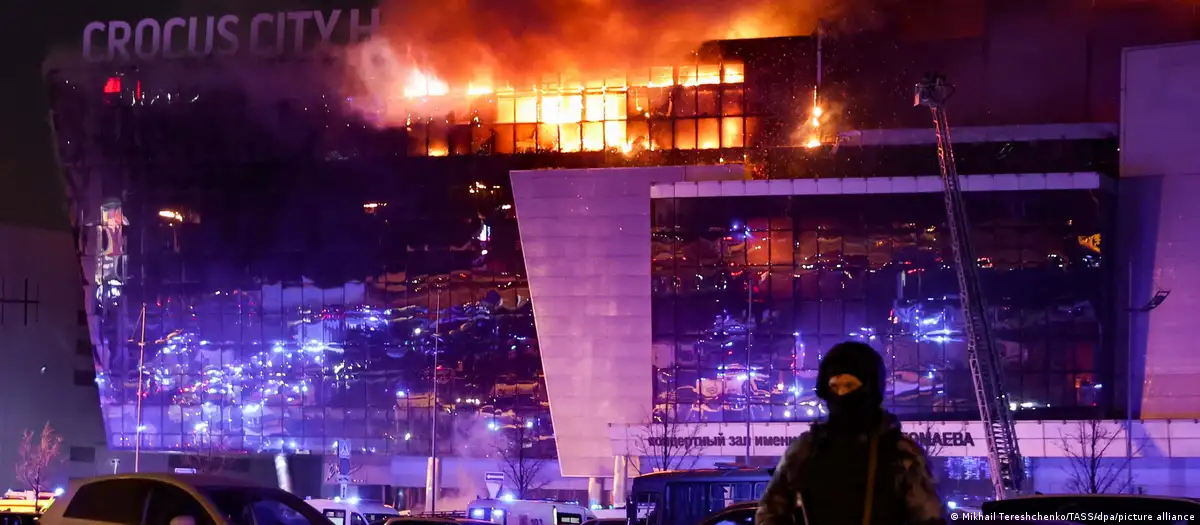An offshoot of ISIS in Afghanistan, “Islamic State Khorasan” or ISIS-K has stepped up its activities in Russia and has already threatened to carry out terrorist attacks elsewhere in Europe.
(DW) Russia suffered its deadliest terrorist attack in 20 years on Friday (22/03), when gunmen stormed a concert hall on the outskirts of Moscow and killed at least 137 people and injured more than a hundred.
Shortly after the attack, the Afghan branch of the “Islamic State” (IS) terrorist organization, known as “Islamic State Khorasan” or IS-K, took responsibility in a brief statement released by the Amaq news agency, linked to the group, via Telegram.
IS-K is known as one of the most lethal branches of the “Islamic State”, the transnational terrorist group that presided over a now-defunct proto-state in parts of Iraq and Syria. IS-K has killed thousands of people in Afghanistan and Pakistan in attacks carried out since 2015.
The group’s name derives from Khorasan, an ancient term for a territory that roughly covers parts of present-day Iran, Turkmenistan and Afghanistan, although its activities extend beyond this region. As well as carrying out deadly attacks in Iran, Pakistan, Tajikistan and Uzbekistan, IS-K has also been involved in operations against the United States and Europe.
What is IS-K?
IS-K was formed in 2014 by a faction of defectors from the Taliban and Al Qaeda in Pakistan and Afghanistan who adopted a more violent interpretation of jihadism. In 2015, the group formally identified itself as an extension of IS in the Khorasan region. Like the “Islamic State”, IS-K aims to establish a transnational caliphate, a state for Muslims governed according to its own radical interpretation of Islam.
Analysts describe the connections between IS-K members and like-minded terrorist groups as fluid, with fighters and factions from Al Qaeda, the Taliban and other militias frequently changing alliances to join IS-K.
Before the Taliban took power in Afghanistan in August 2021, US and Afghan government forces at the time attacked IS-K, killing many of its mid- and senior-level leaders. However, the security vacuum left by the departure of US forces from Afghan territory has breathed new life into the group and allowed it to set up new training camps and expand its global networks.
The Taliban authorities claim that they have tried to contain IS-K’s activities, claiming that the security forces have arrested thousands of the group’s members. But the Taliban’s ability to stop the organization has been deemed insufficient and ineffective, as its attacks on ethnic and religious minorities in Afghanistan have become more frequent and more deadly.
The United Nations has repeatedly expressed concern that organizations such as Al Qaeda and IS-K could acquire advanced NATO weapons left behind when international troops withdrew from Afghanistan.
ISIS-K’s recent activities
The “Islamic State Khorasan” claimed responsibility for a bomb attack on January 3 that killed 95 people in Kerman, Iran. The United States said it had alerted Iranian authorities to the possibility of an attack before the incident, just as it said it had done before the attack in Moscow last Friday.
This month, US intelligence indicated that ISIS-K had an active presence in Russia – with plans to orchestrate attacks in Moscow. At the time, Russia’s Federal Security Service (FSB) said it had prevented an armed IS-K attack on a synagogue in the Kaluga region, near the Russian capital, on March 7.
But what is the jihadists’ issue with Russia? Russian airstrikes on behalf of Syrian President Bashar al-Assad against IS positions changed the course of the civil war in Syria. Since then, many “Islamic State” leaders have condemned Russian President Vladimir Putin as a leader who has the blood of Muslims on his hands. ISIS-K propaganda also refers to the history of the Soviet intervention in Afghanistan.
But in addition to Russia, the “Islamic State Khorasan” is also threatening to carry out terrorist attacks elsewhere in Europe. The German police, for example, have arrested several IS-K supporters in recent years. In March, two alleged IS supporters were arrested in the German state of North Rhine-Westphalia and accused of planning an attack on the Swedish parliament.
In the same week, police in the Netherlands arrested two more people, a man from Tajikistan and his wife, on similar suspicions of links to terrorism.
ISIS-K leaders have also promised to launch attacks against Sweden, the Netherlands and Denmark following episodes in which the Koran was burned in those countries.
*** Translated by DEFCONPress FYI Team ***
